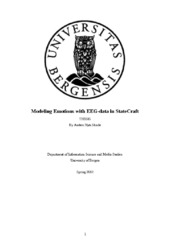Modeling emotions with EEG-data in StateCraft
Master thesis
Permanent lenke
http://hdl.handle.net/1956/5972Utgivelsesdato
2012-06-01Metadata
Vis full innførselSamlinger
Sammendrag
Emotions have been shown to play an important partin human decision making, and emotions inArtificial Intelligence have been shown to affectagent performance and believability. The aim ofthis thesis is to use EEG-data to model players'emotions. The emotion model was incorporated intothe existing Emotion module in the computer gameknown as StateCraft. Using artificial neuralnetworks as a tool, two different models of theplayers' emotions were created, a general modeland acountry specific model, resulting in fourdifferent configurations of the Emotion module.Simulationsof these four different configurations of theEmotion module were conducted.Statistical analysis of the simulation data showsthat the agents perform worse overall withemotionsthan without. The country specific model appearsto perform better than the general model in thesimulations. Analysis also indicates that the fournew EEG-based configurations perform worse overallthan the existing Emotion module which is based ongame states . The EEG-based emotions promote morerisky behavior, and for some countries that canhave a very negative effect on performance.
